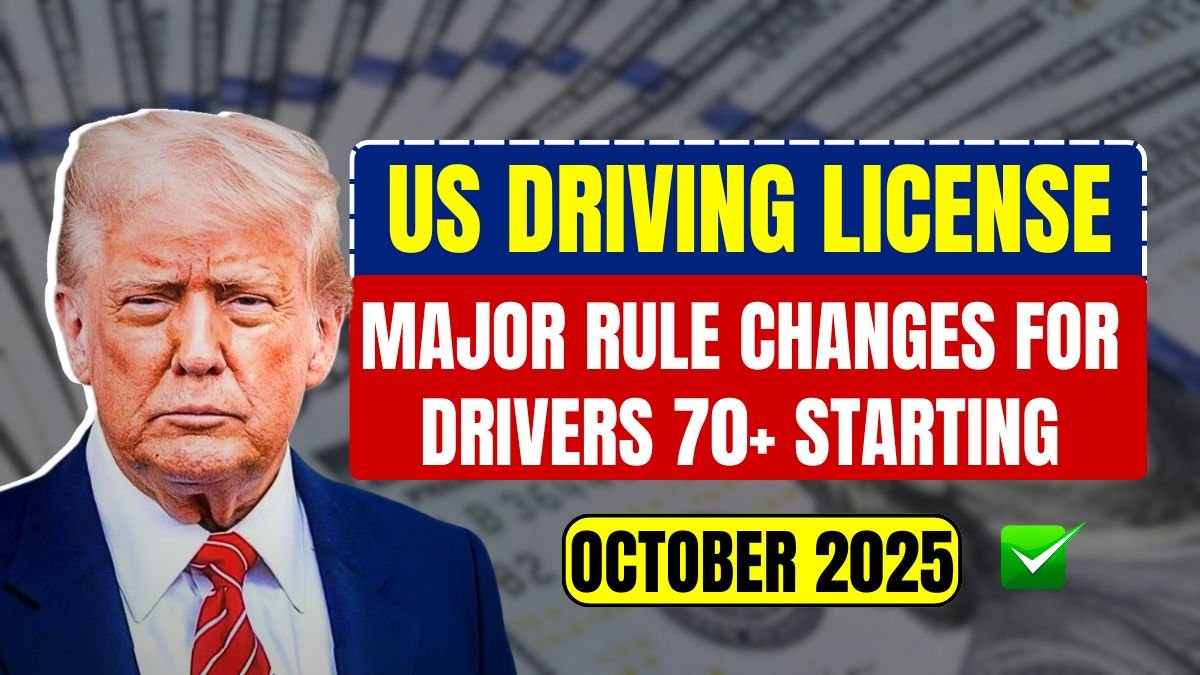US Driving License Major Rule Changes: Starting in October 2025, the U.S. Department of Transportation will implement a new national policy specifically designed for senior drivers age 70 and older. This policy aims to maintain road safety while also respecting the independence of older Americans who are still leading active and independent lives.
The aging population in the United States is steadily growing, and for them, driving is not just a convenience, but a symbol of independence. The government’s goal is to ensure they remain safely on the roads—not only for their own safety, but also for the safety of others.
Why this change is necessary
Today, more than 48 million people in the United States are 65 years of age or older, and most of them have a valid driver’s license. This number is expected to grow even faster in the coming years. These older people rely on vehicles for their daily activities—such as grocery shopping, doctor visits, or attending social gatherings.
However, some natural changes occur with age—such as slower reaction times, reduced vision, or memory problems. All of these factors can affect driving ability.
The new policy is not aimed at license revocation due to the age but to consider individual abilities of the drivers. In other words, this legislation will emphasize on individual evaluation as opposed to one size fits all. This will ensure road safety besides guarding dignity and independence of the aged.
Key Points of the New Law
The biggest alteration in this legislation is that the procedure of renewing a driving license is now staged according to age and personal capacity amongst the elderly citizens.
| Age Group | Renewal Requirement |
|---|---|
| 70–79 years | Regular renewal with vision and reaction test |
| 80–86 years | In-person renewal required every 2 to 4 years |
| 87 years and above | Annual road test and medical certificate required |
This step-by-step system will be useful to determine the possible risks among older drivers so that they can take the right response.
Required Tests: A Procedure of the Competency of all Drivers.
According to this new policy, there are numerous kinds of tests that can be performed in every state, basing on the health and safety condition of senior drivers. These include:
- Vision Test:
- The driver’s vision will be tested to ensure they can clearly see road signs, traffic lights, and other vehicles.
- Cognitive Screening:
- This test will examine memory, decision-making, and reaction time. It will assess how quickly and accurately a driver can respond to unexpected road situations.
- Road Test:
- For drivers over the age of 87, or those about whom a doctor or family has raised concerns, a real road test will be mandatory.
Can anyone report a senior driver?
Yes, this new rule gives family members, doctors, and caregivers the right to report a senior driver to the DMV (Department of Motor Vehicles) if they believe they are unable to drive safely on the road. The DMV will then re-evaluate the driver’s competence.
However, it is important that such reports are based on genuine safety concerns, not personal differences or emotions. The goal is not to harass the elderly, but to ensure everyone’s safety.
State-wise Variations: Each State Has Its Own Approach
Even though this policy will be enforced at the federal level, the states have been left with the freedom to apply the policy in the way it best suits them. This implies that there will be states that will be stricter whereas others will be flexible.
For example:
| State | Special Requirement |
|---|---|
| California | In-person renewal required every time after age 70 |
| Florida | Vision test required at every renewal after age 80 |
| Texas | Annual health check and DMV check-in required after age 85 |
| New York | Doctor’s medical note may be required after age 80 |
These variations will be aimed to streamline the policy according to the local population, climate and traffic conditions.
Limited License: Striking a Balance between Freedom and Safety.
The other interesting provision of the new policy is the Restricted License. This is among the elderly citizens who are not completely in a state of driving but can make safe driving under restricted conditions.
Indicatively, these motorists can be issued with licenses under the following conditions:
- Daytime driving only.
- Local area driving only.
- No highway driving.
These can be organized in a way that does not affect the safety of the road as older individuals stay in control of their lives.
What are the options when driving is no longer possible?
In other cases, some individuals are no longer safe drivers because of their health or old age. This does not necessarily imply that they should be deprived of mobility. In the United States, today they have a number of options that can assist them to travel safely:
- Rides that are shared, such as Uber or Lyft, in which a car can be summoned in minutes.
- Specially designed senior and disabled shuttle services Community shuttle services or Paratransit programs.
- Volunteer driver programs, where community members help older people get to hospitals, markets, or religious sites.
- Family and friends can be reliable transport to essential destinations.
These services allow older people to continue their daily routines and remain socially active.
Conclusion: A Balanced Approach to Freedom and Security
This new policy, which will take effect in October 2025, is not simply a driver’s license law, but a balanced approach to safety and respect.
Its primary objective is not to take away the independence of older Americans, but to ensure their safety and security. The key is to maintain responsible driving on the road. Individual testing, limited licenses, and alternative transportation—all these measures ensure that seniors maintain their independence and self-esteem, while keeping the roads safe for everyone.
This government effort could truly become a model for other countries to follow in the future—where “ability,” not “age,” becomes the driving criterion.
FAQs:
Q. Who is affected by the new rule?
A. Drivers aged 70 and above in the U.S. will be subject to the new license renewal and assessment requirements.
Q. Does this rule revoke licenses based on age?
A. No. Licenses will be evaluated based on individual abilities, not just age.
Q. Can someone report a senior driver?
A. Yes. Family members, caregivers, or doctors can report a driver to the DMV if they believe the person is unsafe.



